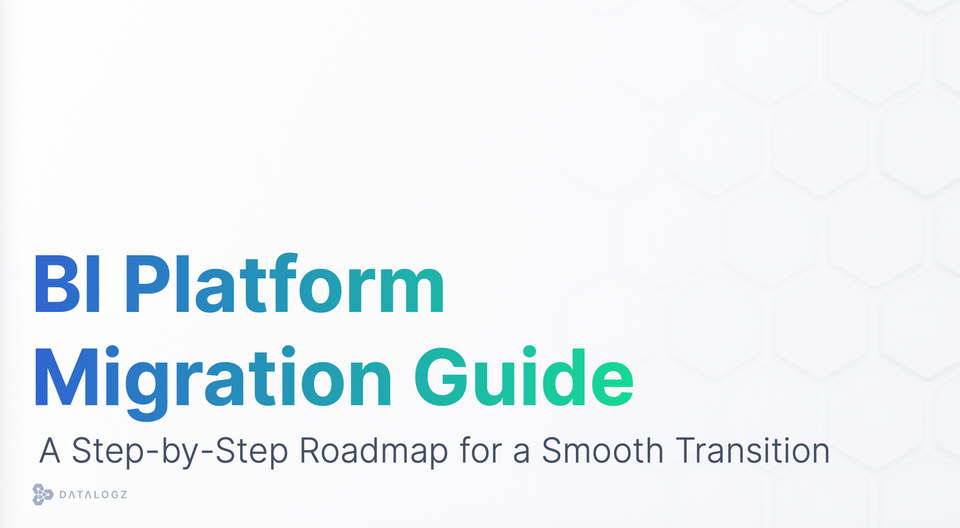Importance of BI Standardization and Centralization
Strategies for implementing BI standardization and centralization include creating standardized data definitions, implementing a centralized BI Ops platform, and providing employee training and communication.

Business Intelligence (BI) has revolutionized the way organizations make decisions by providing valuable insights into their operations. However, as organizations grow and their data becomes increasingly complex, managing and analyzing data can become difficult. This is where BI standardization and centralization come into play.
BI standardization involves the process of creating a set of standardized data definitions, formats, and structures to ensure consistency and accuracy in data analysis. On the other hand, BI centralization involves the process of consolidating data sources into a single, centralized platform to provide a more efficient and effective way of managing and analyzing data. Both BI standardization and centralization are critical in improving BI efficiency and effectiveness.
The Importance of BI Standardization
BI standardization offers several benefits, including increased consistency and efficiency. When data is standardized, it becomes easier to compare and analyze information across different departments and systems. This helps to eliminate any inconsistencies and discrepancies in data, making it more reliable and accurate. In addition, standardized data allows organizations to save time and resources by reducing the need for manual data preparation and cleaning.
Standardization also ensures that all stakeholders are using the same data definitions and formats, which reduces the risk of misinterpretation and confusion. With standardized data, everyone within an organization can trust the accuracy and reliability of the data, allowing for more confident decision-making.
The Benefits of BI Centralization
Centralizing BI systems is also crucial for improving BI efficiency and effectiveness. By consolidating data sources into a single, centralized platform, organizations can more easily manage and analyze their data. This provides a more comprehensive view of the organization's operations, making it easier to identify trends and insights that might otherwise be missed.
Centralization also enhances data security and accessibility. By storing all data in one location, organizations can more easily control who has access to the data and ensure that it is being used in compliance with regulations and policies. In addition, centralization makes it easier to quickly access data, reducing the time needed for data retrieval and analysis.
Implementation Strategies for BI Standardization and Centralization
Implementing BI standardization and centralization requires careful planning and execution. One strategy for standardization is to create a set of standardized data definitions and formats that are used across the organization. This can be achieved through the use of data dictionaries and other reference materials. It's also important to involve stakeholders from different departments and levels of the organization in the standardization process to ensure that everyone's needs are met.
When it comes to centralization, one strategy is to implement a centralized BI platform that consolidates data sources and provides a single source of truth. This can be achieved through the use of data warehouses, data marts, or other centralized systems. It's important to choose a platform that is scalable, secure, and can integrate with other systems as needed.
Employee Training and Communication
Finally, it's important to prioritize employee training and communication when implementing BI standardization and centralization. It's essential to educate employees on the benefits of standardization and centralization and to provide them with the necessary tools and resources to effectively use the new systems. In addition, ongoing communication and support are critical to ensuring successful adoption and continued use of the new systems.
BI standardization and centralization are essential for improving BI efficiency and effectiveness. Standardization ensures consistency and accuracy in data analysis, while centralization enhances data security and accessibility. Strategies for implementing BI standardization and centralization include creating standardized data definitions, implementing a centralized BI Ops platform, and providing employee training and communication. By prioritizing standardization and centralization, organizations can achieve a more comprehensive view of their operations and make more confident, data-driven decisions.
Key takeaways:
- BI standardization and centralization are critical for improving BI efficiency and effectiveness.
- Standardization offers benefits such as increased consistency and efficiency, while centralization enhances data security and accessibility.
- Implementation strategies for BI standardization and centralization include creating standardized data definitions, implementing a centralized BI platform, and providing employee training and communication.
- Prioritizing employee training and communication is essential for successful implementation and adoption of BI standardization and centralization.
- By implementing BI standardization and centralization, organizations can achieve a more comprehensive view of their operations and make more confident, data-driven decisions.



